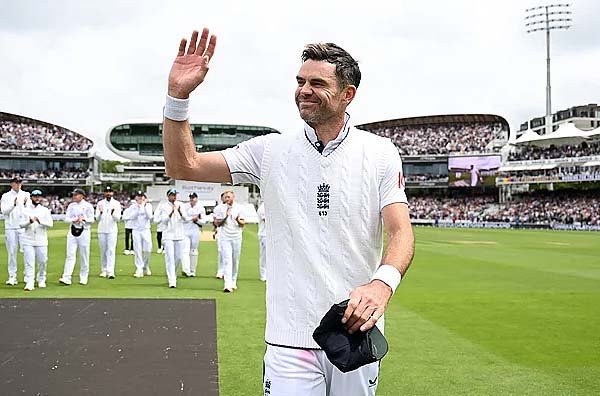England’s legendary fast bowler James Anderson has stunned the cricket world with a candid admission about his retirement from Test cricket. In a revealing interview, Anderson disclosed that the decision to end his illustrious Test career was not his own—but rather, one forced upon him by the team management. This confession has sparked widespread debate and sympathy among fans and pundits alike, shining a light on the tough realities faced by even the greatest athletes when transition time comes.

The End of an Era: Anderson’s Illustrious Test Career
James Anderson retired from Test cricket in July 2024, after a remarkable journey spanning over two decades. His final match was the opening Test against the West Indies at Lord’s, a fitting stage for a player who had become synonymous with England’s bowling attack. Anderson’s career numbers speak for themselves:
Test matches: 188
Test wickets: 704 (second only to spinners Muttiah Muralitharan and Shane Warne)
Five-wicket hauls: 32
Ten-wicket matches: 3
He remains the most prolific fast bowler in Test history, a record that may stand for generations.
Anderson’s Shocking Confession: “I Wasn’t Anywhere Near Retirement”
Despite his age—42 at the time of retirement—Anderson insists he was far from ready to hang up his boots. Speaking to The Independent, Anderson revealed:
“I’m still a bit mixed on it. It’s one of those things that was out of my hands. They made the decision to move away from having me in the team. That was pretty gutting at the time. I’d been preparing before my last Test match for the next six, 12, 18 months of Test cricket; I wasn’t anywhere near retirement in my head. I felt I still had that want and hunger to play, to do the hard yards, the training, the skill work.”
Anderson’s comments make it clear that he believed he could have continued at the highest level, possibly even through the 2025 Ashes in Australia. However, the decision to retire was made for him by the England management, including head coach Brendon McCullum, captain Ben Stokes, and ECB managing director Rob Key.
Why Did England’s Management Push for Anderson’s Retirement?
The move to phase out Anderson was driven by a desire to look to the future. England’s leadership wanted to give younger bowlers more opportunities and begin the transition process in the Test side. Anderson’s retirement, while controversial, was seen as a necessary step for the team’s long-term planning.
Management’s Perspective: The team wanted to build for the future, and Anderson’s continued presence was seen as potentially blocking the development of younger talent.
Anderson’s Reaction: The decision left Anderson disappointed and “mixed” in his emotions, but he accepted it with professionalism and dignity.
Transition Role: After retiring, Anderson was appointed as England’s bowling mentor for the remainder of the Test series, a role he embraced with enthusiasm.
Anderson’s Legacy and What Comes Next
James Anderson leaves behind a legacy as one of England’s greatest ever cricketers. His longevity, skill, and dedication have inspired countless players and fans around the world. Even in retirement, Anderson continues to contribute to English cricket, sharing his vast experience with the next generation of bowlers.
Key Takeaways from Anderson’s Retirement Confession
- Anderson was forced into retirement by England’s management, not by his own choice.
- He believed he could have played for at least another year, possibly until the 2025 Ashes.
- The decision was driven by the team’s need to transition to younger bowlers.
- Anderson has taken up a mentoring role, helping to develop England’s future fast bowlers.
FAQs
1. Was James Anderson forced to retire from Test cricket?
Yes, Anderson has revealed that the decision to retire was made by England’s management, not by himself. He felt he still had the hunger and ability to play at the highest level.
2. Who made the decision for Anderson to retire?
The decision was made by England’s head coach Brendon McCullum, captain Ben Stokes, and ECB managing director Rob Key.
3. How many Test wickets did James Anderson take in his career?
Anderson finished his Test career with 704 wickets in 188 matches, making him the most successful fast bowler in Test history.
4. What role did Anderson take up after retirement?
Anderson became England’s bowling mentor for the remainder of the Test series after retiring, helping to develop younger bowlers.
5. Did Anderson think he could have played longer?
Yes, Anderson believed he could have continued playing Test cricket for at least another year, possibly until the 2025 Ashes in Australia.
Conclusion
James Anderson’s shocking confession about his retirement has revealed the often unseen pressures and politics behind major sporting decisions. While he may have left the field earlier than he wanted, Anderson’s legacy as England’s greatest fast bowler is secure. His story is a reminder that even the most celebrated athletes are not always in control of their own destiny, but their contributions to the game live on long after they’ve left the pitch.